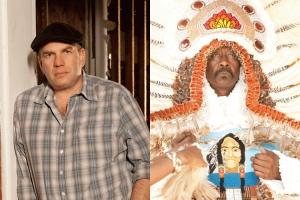
David Simon – photo ©Paul Schiraldi; Clark Peters – Pinterest
“Life is glorious and vibrant and joyous at points, but it is essentially tragic. That’s not a unique David Simon perspective.” So sayeth David Simon, (pictured left; right is a Mardi Gras Indian portrayed by Clarke Peters), executive producer with Eric Overmyer of Treme, in a long interview on Salon conducted by Matt Zolar Seitz.  The HBO series about New Orleans in the wake of Hurricane Katrina, which ended its second season last Sunday night, is unique as a musical drama for its grounding of psychologically acute and entertaining characterizations in a verifiably real social context — an accomplishment attributable to Simon’s hard-boiled yet compassionate philosophy and journalistically-influenced creative practices. It’s all laid out in the interview, which also makes a strong case for the centrality of cities to the future of America.
 [W]hat is wonderful about the city, and what works when nothing else seems to work, is the idea that people are experiencing urban life, which is the only life that America is going to have going forward. I mean, we’re not going back to small-town values. Sorry! Y’know? Regardless of the rhetoric of any given politician at any moment, it’s big-city values that are going to save us or thwart us. Small town values are irrelevant. Eighty-three percent of us live in metropolitan areas now, or areas that are at least oriented toward cities, and the health of those cities determine the health of metro areas. Get it straight. Jefferson lost that argument, Hamilton won.ÂUntil we find some affection for who we are and who we’re going to be, and until we become inclusive about it — “inclusive” being the important word here — the future is either gonna be gated communities and a lot of poor people, or we’re gonna figure out how the city works. And that’s going to be the new America.
-  In Chicago, blues, midwestern metal and neighborhood ethnic musics dominate while die-hard beboppers, alt. rockers and avant-garde jazzers cross paths in the  night and a political heavy-weight takes over City Hall.
- In Austin, the SXSW crowd runs in constant tense parallel with the Lone Star state’s conservatively based legislature and constituency.
- In Nashville, an entrenched but threatened country music industry deals with contradictions and change.
- In New York, befuddled critics survey the rapidly morphing, boundary-less and cut-throat scene, challenged by ever-higher rents and media in transition.
I don’t want to give away all my narrative arcs; suffice it to say there are ingenious ways to make stories sing and songs advance stories. Is there an audience? I guess the success of “Glee” and “American Idol” don’t prove people will tune in for sophisticated musical fare. But what a boon it would be for the nation if localized activities were given their due, promoting on tv (or your preferred viewing device) the artistic distinctions and appeal of one and another of our colorful metropoli in conjunction with strong portraits of individuals representing our ever-more diverse population and a generous helping of clear-eyed yet never didactic contemporary sociology. Hold the special effects, forensic investigations and vampires. Treme demonstrates it can be done.
